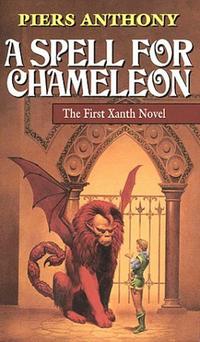 What we’re gonna do right here is go back. Way back. Back into time. This week I just completed reading a book from the my youth that I hadn’t revisited in a long time.
What we’re gonna do right here is go back. Way back. Back into time. This week I just completed reading a book from the my youth that I hadn’t revisited in a long time.
I can’t quite peg when I first read Piers Anthony’s A Spell for Chameleon, but it was one of the most formative books of my youth. Triangulating a little, I believe Castle Roogna had been published when I first read Chameleon, because I hungrily devoured Roogna and The Source of Magic quickly thereafter. 1979, 12 years old, 6th or 7th grade feels about right. At just the point when a young geek has graduated from the young adult fantasy of his time (The Hobbit, The Chronicles of Narnia, The Chronicles of Prydain) and is ready for some more adult fare.
And that’s exactly what A Spell for Chameleon was, although it doesn’t feel that way to start. Rereading the book, it’s not the most complex piece of literature. When I first started the reread, I was disappointed in the amount of straight exposition. The characters seemed simplistic and paper thin. The plot seemed to move along through a number of contrived conveniences.
But then Bink’s tale of trying to uncover his magic talent and avoid exile from the magic land of Xanth becomes rich in adult complexity and nuances. There are hints of this in the rape “trial” early in the book, the encounter with Crombie the Soldier, and Bink’s posession by a shade. After the Evil Magician Trent enters the stage though, the many facets of leadership, wisdom, heroism, self-doubt, villainy, self-sacrifice, romance, and love emerge. While still eminently, and tastefully, accessible to a teenager, A Spell for Chameleon actually uses the tropes of the fantasy genre to reveal the complexity of adult human relations.
Not to mention Anthony’s take on the female nature (the titular Chameleon) and relationships between men and women.
To sum up, A Spell for Chameleon has held up well over time. In fact, as a much more mature individual, it’s even better than I remembered. However, that dose of Xanth will probably do me for quite a while.
And now a few words about the tragedy of Xanth’s legacy.
One of the fun things about reading Fantasy is the emphasis on extended series of novels. Like the Romance and Mystery genres, many Fantasy readers seem to thrive on getting more of the same. This can also be considered one of the pitfalls of the genre, the Xanth series being a prime example.
In my teens I was sucker for series. Of course I read and revered The Lord of the Rings trilogy. I slogged through The Silmarillion. I think I made it through about six of L. Ron Hubbard’s Mission Earth series (complete crap), not to mention the horrid 1000+ pages of Battlefield Earth. I did the first six of The Chronicles of Thomas Covenant. Moorcock’s Elric of Melnibone novels were great stuff. Shannara? Yup. Chronicles of Camber? Yup. Dragon Riders of Pern? Ditto. I even did Anthony’s Bio of Space Tyrant, Incarnations of Immortality, Apprentice Adept, and Cluster series.
Oddly enough, I never actually got sucked into the Discworld series, although I have read one or two recently.
And I made it through nine, maybe even eleven, of the Xanth novels before I came to my senses and realized that authors and publishers were just milking fan adoration all the way to the bank. After being supremely disappointed with Golem in the Gears, Anthony mailed that one in just lathering on the puns, I vowed never to read more than three books in a series ever again. To my knowledge I’ve held to that.
Reading the Wikipedia page for Xanth, I was incredulous to see that Anthony went on to publish a grand total of 33 Xanth novels, with two more to come. Piers Anthony seems like a great human being, who’s brought a lot of enjoyment to people. I find it sad that he’s become so typecast into the world of Xanth that it’s “just about the only thing the publishers want.”